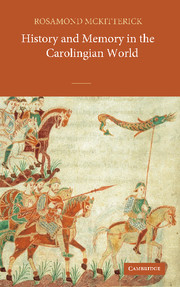Book contents
- Frontmatter
- Contents
- Preface
- Acknowledgements
- List of abbreviations
- 1 Introduction: History and memory in the Carolingian world
- 2 Carolingian history books
- 3 Paul the Deacon's Historia langobardorum and the Franks
- 4 The Carolingians on their past
- 5 Politics and history
- 6 Kingship and the writing of history
- 7 Social memory, commemoration and the book
- 8 History and memory in early medieval Bavaria
- 9 The reading of history at Lorsch and St Amand
- 10 Texts, authority and the history of the church
- 11 Christianity as history
- 12 Conclusion: History and its audiences in the Carolingian world
- Bibliography
- Index of manuscripts
- General index
12 - Conclusion: History and its audiences in the Carolingian world
Published online by Cambridge University Press: 15 December 2009
- Frontmatter
- Contents
- Preface
- Acknowledgements
- List of abbreviations
- 1 Introduction: History and memory in the Carolingian world
- 2 Carolingian history books
- 3 Paul the Deacon's Historia langobardorum and the Franks
- 4 The Carolingians on their past
- 5 Politics and history
- 6 Kingship and the writing of history
- 7 Social memory, commemoration and the book
- 8 History and memory in early medieval Bavaria
- 9 The reading of history at Lorsch and St Amand
- 10 Texts, authority and the history of the church
- 11 Christianity as history
- 12 Conclusion: History and its audiences in the Carolingian world
- Bibliography
- Index of manuscripts
- General index
Summary
The Franks' interest in history is distinctive in early medieval Europe as a whole. Their complex relationship with the past was articulated in many different contexts and a host of different kinds of historical and chronologically ordered texts, many of which were created for the first time by the Franks in the Carolingian period. It is evident in their extensive copying and preservation of histories of Roman antiquity, of the early Christian church and of the barbarian successor states to Rome. It is dramatically expressed in their own contemporary histories. All these have been discussed in the preceding chapters of this book. Yet history for the Franks was not just about the distant past, but also concerned the way in which contemporary memory is transmuted into history. It is on this that I focus in this concluding chapter.
The crisis of 817: contemporary memory and history
In the autumn of 817, Hetti, archbishop of Trier, wrote to inform Frothar, bishop of Toul, of an order sent by the Emperor Louis the Pious. Frothar was to prepare all those in the diocese liable for military service for an expedition to Italy, where, inspired by Satan, King Bernard was preparing to rebel against Louis. Louis, and Hetti, as legate, had received intelligence not of a rebellion already in progress but of preparations for it. The letter survives in a collection dated to the ninth century, possibly in the lifetime of Frothar himself, who died in 847.
- Type
- Chapter
- Information
- History and Memory in the Carolingian World , pp. 265 - 283Publisher: Cambridge University PressPrint publication year: 2004



